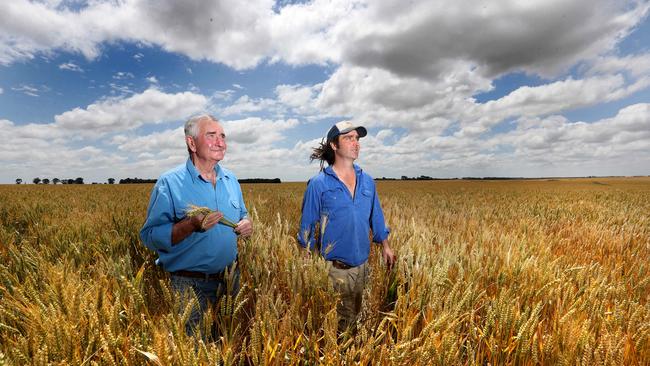Australian crops forecast to rebound from drought, fires but China tensions mount
After being ravaged by drought and bushfires, strong winter rain has been a blessing for Australian crops, but mounting tensions with China are a serious concern.
Australian crop production is forecast to surge in a big way but couldn’t come at a worse time as tensions mount with the nation’s biggest trading partner.
The Australian Bureau of Agricultural and Resource Economics and Science released its latest projections on Tuesday, saying output from crops planted in winter should leap by 64 per cent this financial year to 47.9 million tonnes – 20 per cent above the 10-year average.
That’s mainly driven by increased production in NSW thanks to strong winter rainfall.
Also, the area of land dedicated to winter crops in 2019-20 is estimated to have jumped by 23 per cent compared with last financial year’s drought-hit season.
Oats production is expected to increase by 93 per cent, wheat by 91 per cent, canola by 47 per cent, barley by 25 per cent and chickpeas by a whopping 152 per cent.
CommSec senior economist Ryan Felsman says it will be the best winter harvest in four years with downpours helping farmers who were also devastated by bushfires.
But Chinese tariffs of more than 80 per cent on barley exports, imposed in May, are having a major financial impact on those who farm it.

“Australia’s political stoush with our largest (trading) partner China couldn’t come at a worse time for our farmers and agricultural producers,” Mr Felsman said.
“And shortages of labour due to state and international border closures is another headache for rural Australia.”
Australian Bureau of Statistics trade surplus figures for July, released last week, showed the ongoing political spat with China had started to take its toll, with rural exports suffering the biggest monthly decline since January 1983.
The Asian superpower raised tariffs on Australian beef in July and last month slapped anti-dumping measures on Australian wine and also suspended barley imports from Perth-based CBH, the nation’s largest grain exporter, over claims shipments had contained excessive levels of weed seeds – an allegation the company rejects.
Overnight, the remaining two Australian journalists working in mainland China were evacuated and returned home as police and local authorities moved to detain them.
It follows the detainment of Beijing-based Australian television anchor Cheng Lei last week.
On Monday, Rabobank released its latest Rural Confidence Survey results, revealing the badly needed rainfall across much of the country hasn’t been enough to arrest a slide in Australian rural confidence as the sector grapples with worries about overseas trade, COVID-19 and commodity prices.
All states except Queensland and Tasmania recorded some decline in sentiment.


